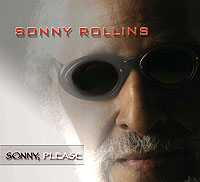Review by Brad Walseth
I've always had a soft spot for tenor great Sonny Rollins. His "The Bridge' (1962) - purchased at a garage sale from a woman whose husband made her sell it because he "didn't like black people" - was the first jazz record I ever owned, and was a great introduction into what became a lifelong love of jazz music. Rollins' big tone and inventive lines seemed to exist somewhere between Hawk and Trane, and were something that immediately dug into my soul and caused me to wear that vinyl out long ago.
Therefore I was somewhat disappointed when I saw Rollins and his band a few years ago. Not that Sonny wasn't an amazing soloist (he was - especially for a 70-something year old man), but listening to him honk, squeal and make like a foghorn for 20 minutes over a Caribbean vamp saddened me, because I felt he deserved better. His Grammy Award winning live (originally a bootleg!) recording - "Without a Song (recorded 4 days after the 9-11 disaster forced him from his apartment 2004) was basically more if the same, although it rose above the status quo by showcasing some of the most incredible and emotional tenor solos you will ever hear on the title track and the incredible "Why Was I Born."
That year Rollins experienced the death of his wife Lucille who managed the financial side of Rollins' career, and in the aftermath he decided to take the reigns himself by starting his own record label - "Doxy" (named after the song he wrote that Miles Davis made famous). His first self-release on the label is "Sonny, Please" - after a phrase Lucille often used, and it features Sonny with his bandmates: long-time bassist Bob Cranshaw, trombonist (and Rollins nephew) Clifton Anderson, Drummer Steve Jordan (Joe Corsello onone song), percussionist Kimati Dinizulu and guitarist Bobby Broom - fresh upon their return from a successful tour of Japan. The occurrences of the last few years seem to have made their mark on Rollins and company because "Sonny, Please" is tight and focused, and may be the best work the beloved saxophonist has done in many years.
The opening title track is my favorite - a potent and almost frighteningly sinister burner on which Sonny twists and bends through some extremely interesting intervallic deviations. Almost scary good - this number is in my opinion the best original from Sonny in a long time. Sonny's playing is gritty - sometimes harsh, yet beautifully compelling. Anderson adds texture and a nice solo. And the rhythm section is tight and vigorous in support.
The standard "Someday I'll Find You" follows - and Sonny shows his amazing ability to go from intensity to charm without losing a beat. His tone is lighter than in his early days, but his note choices are simply stunning as always. On this song (as has been the case often throughout his career), his backing musicians (especially the rhythm section) do not always meet the high standard of their leader, but guitarist Broom adds a pleasing solo here that complements Rollins' fine performance.
"Nishi" is another Sonny original and is a more straight-forward piece with room for everyone to shine. Featuring some nice walking bass by Cranshaw, and more of Broom's delectable guitar work, the song also allows drummer Jordan a fine turn in the solo spot, and Anderson adds some tasty trombone work as well. A nice way to end the opening third of the album.
Another standard - "Stairway to the Stars" follows, and it is such a pleasure to hear that Rollins has been captured - if not in his prime - still in tremendous and mature form. I am not as enamored of the windchimes and shakers percussionist Dinizulu seems compelled to use on these slow numbers, but again Broom and Anderson supply some agreeable reinforcement. However, it is Sonny who clearly is the star - rising above the arrangements again and again as if to pierce the heavens.
The bluesy original "Remembering Tommy" (a tribute to his former pianist - the late Tommy Flanagan) takes the band in yet another welcome direction. Rollins' playing is more rough-edged, but no less intriguing. The presentation is relaxed overall and shines most brightly when the master takes his reed into his mouth. Meanwhile, the delicious interplay between the saxophonist and Broom on the waltzing "Serenade" (a song first heard by the youthful Rollins on the radio in Harlem) recalls his "The Bridge" era days with guitarist Jim Hall.
"Park Palace Parade" ends the album on a Caribbean note, but one that limits the endless soloing over a repetitious vamp that has sometimes marred previous outings in favor of a somewhat tighter, more focused approach (not unlike the album as a whole). A perfect way to end the listening experience with a bittersweet, yet hopeful calypso (a Rollins' trademark). "Sonny, Please" is less a return to form (although I'd argue it is) than a strong musical message to a world too often eager to trade in the value of experience for the transitory thrill of the next new thing.
|

